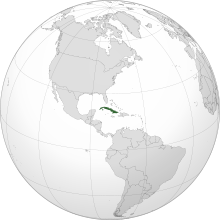LGBT rights in Cuba: Difference between revisions
Content deleted Content added
Rescuing 2 sources and tagging 0 as dead.) #IABot (v2.0.9.4 |
Extended confirmed users 3,137 edits →Post-revolution Cuba: There is no page number for this citation |
||
| Line 43: | Line 43: | ||
According to Ian Lumsden, traditional Spanish [[machismo]] and the [[Catholic Church]] have disdained effeminate and sexually passive males for centuries. The [[homophobia]] exposed during the revolution was a mere continuation of the well-established culture of machismo and the rigid gender roles of pre-revolutionary Cuba.<ref name="Lumsden"/> [[Barbara Weinstein (historian)|Barbara Weinstein]], professor of Latin American history at [[New York University]] and co-editor of the ''[[The Hispanic American Historical Review|Hispanic American Historical Review]]'', said that gay people were defined as deviant and decadent but not weak or sick. She also claimed that the way that the Cuban revolution came to power gave it a stronger sense of masculinity than other revolutions. The guerrilla experience pervaded the political structure and the guerrilla army itself became the nucleus of a new society.<ref>{{Cite web|url=https://groups.yahoo.com/|title=Yahoo! Groups|website=groups.yahoo.com}}</ref> |
According to Ian Lumsden, traditional Spanish [[machismo]] and the [[Catholic Church]] have disdained effeminate and sexually passive males for centuries. The [[homophobia]] exposed during the revolution was a mere continuation of the well-established culture of machismo and the rigid gender roles of pre-revolutionary Cuba.<ref name="Lumsden"/> [[Barbara Weinstein (historian)|Barbara Weinstein]], professor of Latin American history at [[New York University]] and co-editor of the ''[[The Hispanic American Historical Review|Hispanic American Historical Review]]'', said that gay people were defined as deviant and decadent but not weak or sick. She also claimed that the way that the Cuban revolution came to power gave it a stronger sense of masculinity than other revolutions. The guerrilla experience pervaded the political structure and the guerrilla army itself became the nucleus of a new society.<ref>{{Cite web|url=https://groups.yahoo.com/|title=Yahoo! Groups|website=groups.yahoo.com}}</ref> |
||
Cuban gay writer [[Reinaldo Arenas]] wrote, "[T]he decade of the sixties ... was precisely when all the new laws against homosexuals came into being, when the persecution started and concentration camps were opened, when the sexual act became taboo while the 'new man' was being proclaimed and masculinity was being exalted."<ref>{{Cite web|url=https://www.salon.com/2001/01/04/havana/|title=Whorehouse of the Caribbean|date=5 January 2001|website=Salon.com}}</ref> |
Cuban gay writer [[Reinaldo Arenas]] wrote, "[T]he decade of the sixties ... was precisely when all the new laws against homosexuals came into being, when the persecution started and concentration camps were opened, when the sexual act became taboo while the 'new man' was being proclaimed and masculinity was being exalted."<ref>{{Cite web|url=https://www.salon.com/2001/01/04/havana/|title=Whorehouse of the Caribbean|date=5 January 2001|website=Salon.com}}</ref> |
||
<blockquote>Camps of forced labour were instituted with all speed to "correct" such deviations ... Verbal and physical mistreatment, shaved heads, work from dawn to dusk, hammocks, dirt floors, scarce food ... The camps became increasingly crowded as the methods of arrest became more expedient ...<ref name="Hirschfeld-since1898">{{cite book|title=Health, politics, and revolution in Cuba since 1898|author=Katherine Hirschfeld}}</ref></blockquote> |
|||
In 1965, the country-wide [[Military Units to Aid Production]] ({{lang|es|Unidades Militares de Ayuda a la Producción}}; UMAP) program, located in the [[Camagüey Province]],<ref name=":02"/> was set up as an alternative form of military service for members of [[Pacifism|pacifist]] religious groups, such as [[Jehovah's Witnesses]], [[hippie]]s, [[conscientious objector]]s, and gay men. It was believed that the work, together with the strict regimes operating within the UMAP camps, would "rehabilitate" the participants. The camps became notorious both inside and outside Cuba.<ref name="Solidarity"/> Although the camps ended up targeting gay men more than most, "there is no evidence that [they] were created with homosexuals exclusively in mind."<ref name="Lumsden"/> There is a debate whether or not these camps were labor or concentration camps. That being said, these camps were notorious for holding prisoners for up to three years without a charge.<ref>{{Cite journal|last=Guerra|first=Lillian|date=2010|title=Gender Policing, Homosexuality, and New Patriarchy of the Cuban Revolution, 1965-70|journal=Social History|volume=35|issue=3|pages=268–289|doi=10.1080/03071022.2010.487378|issn=0307-1022|pmid=20662167|via=JSTOR|s2cid=20036775}}</ref> |
In 1965, the country-wide [[Military Units to Aid Production]] ({{lang|es|Unidades Militares de Ayuda a la Producción}}; UMAP) program, located in the [[Camagüey Province]],<ref name=":02"/> was set up as an alternative form of military service for members of [[Pacifism|pacifist]] religious groups, such as [[Jehovah's Witnesses]], [[hippie]]s, [[conscientious objector]]s, and gay men. It was believed that the work, together with the strict regimes operating within the UMAP camps, would "rehabilitate" the participants. The camps became notorious both inside and outside Cuba.<ref name="Solidarity"/> Although the camps ended up targeting gay men more than most, "there is no evidence that [they] were created with homosexuals exclusively in mind."<ref name="Lumsden"/> There is a debate whether or not these camps were labor or concentration camps. That being said, these camps were notorious for holding prisoners for up to three years without a charge.<ref>{{Cite journal|last=Guerra|first=Lillian|date=2010|title=Gender Policing, Homosexuality, and New Patriarchy of the Cuban Revolution, 1965-70|journal=Social History|volume=35|issue=3|pages=268–289|doi=10.1080/03071022.2010.487378|issn=0307-1022|pmid=20662167|via=JSTOR|s2cid=20036775}}</ref> |
||
Revision as of 05:30, 17 June 2023
LGBT rights in Cuba | |
|---|---|
 | |
| Status | Legal since 1979 |
| Gender identity | Gender change allowed since 2008; Surgery not required since 2013 |
| Military | LGBT people allowed to serve openly since 1993 |
| Discrimination protections | Constitutional protections based on sexual orientation and gender identity since 2019[1][2][3] |
| Family rights | |
| Recognition of relationships | Same-sex marriage since 2022 |
| Adoption | Since 2022 |
